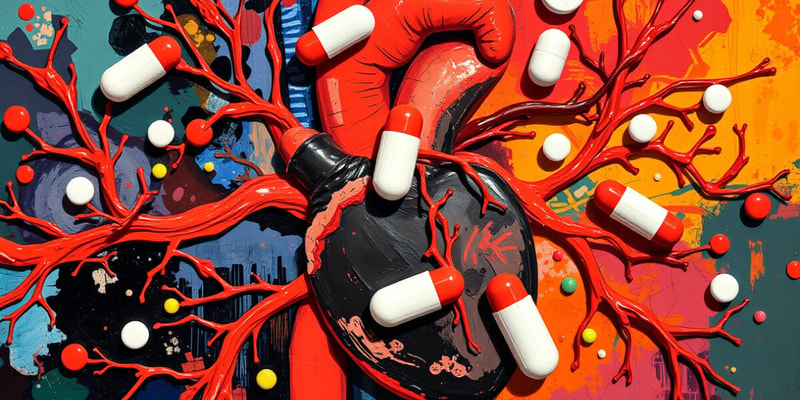Questions and Answers
What is a primary therapeutic use of ACE inhibitors?
Which mechanism of action is associated with angiotensin II receptor blockers (ARBs)?
What is a common adverse effect related to ACE inhibitors?
What cardiovascular condition is NOT typically indicated for the use of ARBs?
Signup and view all the answers
Which effect is NOT achieved by angiotensin-converting enzyme (ACE) inhibitors?
Signup and view all the answers
What is the primary action of aldosterone antagonists like spironolactone?
Signup and view all the answers
Which side effect is commonly associated with the use of calcium channel blockers?
Signup and view all the answers
How do calcium channel blockers affect the force of contraction in the myocardium?
Signup and view all the answers
What is a primary benefit of using aldosterone antagonists in patients with heart failure?
Signup and view all the answers
What is one of the key symptoms that may indicate an adverse reaction to calcium channel blockers?
Signup and view all the answers
Which of the following represents a non-selective calcium channel blocker?
Signup and view all the answers
What physiological effect is primarily caused by aldosterone?
Signup and view all the answers
What effect is NOT associated with the use of non-selective beta blockers?
Signup and view all the answers
Which of the following symptoms may indicate toxicity from vasodilators like nitroprusside?
Signup and view all the answers
What is a primary mechanism of action for cardiac glycosides such as digoxin?
Signup and view all the answers
Which adverse effect is typically associated with beta blockers?
Signup and view all the answers
The administration of which medication is primarily associated with treating hypertensive emergencies?
Signup and view all the answers
Which medication is classified as a calcium channel blocker that slows conduction through the AV node?
Signup and view all the answers
What is one of the major therapeutic effects of alpha1 adrenergic blockers?
Signup and view all the answers
Which side effects are commonly associated with alpha1 adrenergic blockers?
Signup and view all the answers
What is the primary action of centrally acting alpha2 agonists?
Signup and view all the answers
What is a common side effect of beta1 blockers?
Signup and view all the answers
Which of the following medications is primarily used to treat hypertension and works by blocking alpha1 adrenergic receptors?
Signup and view all the answers
Which effect is NOT directly associated with beta1 blockers?
Signup and view all the answers
What is a potential cardiovascular effect of centrally acting alpha2 agonists?
Signup and view all the answers
Which beta blocker is known to be cardioselective?
Signup and view all the answers
Which medication acts as a calcium channel blocker used to manage angina and hypertension?
Signup and view all the answers
Study Notes
Cardiovascular System Medications
- Beta-blockers: Slow heart rate; monitor HR to prevent excessive decrease.
Angiotensin-converting Enzyme (ACE) Inhibitors
- Treat hypertension, heart failure, myocardial infarction (MI), and diabetic nephropathy.
- Mechanism: Block formation of angiotensin II, leading to:
- Vasodilation.
- Excretion of aldosterone, sodium, and water.
- Reduction of pathological changes in blood vessels and heart.
- Increased serum potassium levels.
- Examples: Captopril, Lisinopril, Enalapril, Fosinopril.
- Adverse effects include hyperkalemia and serious allergic reactions (e.g., angioedema).
Angiotensin II Receptor Blockers (ARBs)
- Indications: Hypertension, heart failure, MI, diabetic nephropathy.
- Action: Block angiotensin II receptors, resulting in:
- Vasodilation.
- Excretion of aldosterone, sodium, and water.
- Common effects: Headache, dizziness, dry mouth, GI complaints.
- Examples: Losartan, Irbesartan, Valsartan.
Aldosterone Antagonists
- Used for heart failure post-MI and hypertension.
- Mechanism: Block aldosterone receptors, leading to:
- Increased excretion of sodium and water.
- Reduced blood volume.
- Examples: Eplerenone, Spironolactone.
Calcium Channel Blockers (CCBs)
- Indications: Hypertension, angina, cardiac dysrhythmias.
- Mechanism: Slow calcium movement into cells, causing:
- Vasodilation.
- Decreased force of contraction and heart rate.
- Slowed conduction through AV node.
- Examples: Nifedipine (selective), Amlodipine (selective), Verapamil, Diltiazem (non-selective).
Alpha1 Adrenergic Blockers
- Indication: Hypertension.
- Mechanism: Block alpha1 receptors in arterioles, causing vasodilation.
- Side effects: Headache, weakness, dizziness, GI upset.
- Examples: Doxazosin, Prazosin.
Centrally Acting Alpha2 Agonists
- Indication: Hypertension.
- Mechanism: Stimulate alpha2 receptors in the brain, leading to:
- Vasodilation and decreased heart rate.
- Example: Clonidine.
Cardioselective Beta1 Blockers
- Indications: Hypertension, angina, heart failure, tachydysrhythmias, MI.
- Mechanism: Block beta1 receptors, decreasing:
- Force of contraction and heart rate.
- Conduction through AV node.
- Additional action in kidneys reduces renin release.
- Examples: Metoprolol, Atenolol.
Non-selective Beta1 & Beta2 Blockers
- Indications: Same as cardioselective plus cardiac dysrhythmias.
- Mechanism: Block beta1 in myocardium and kidneys, beta2 in lungs.
- Side effects: Respiratory effects, GI effects.
- Examples: Propranolol, Carvedilol, Labetalol.
Vasodilators
- Indication: Hypertensive emergencies.
- Mechanism: Centrally acting, causing rapid BP reduction.
- Adverse effects include cyanide toxicity from nitroprusside.
- Example: Nitroprusside (Nitropress).
Cardiac Glycosides
- Indications: Heart failure, atrial fibrillation.
- Mechanism: Inhibit Na/K/ATPase, increasing contractility and improving CO.
- Side effects include headache and risk of digoxin toxicity.
- Example: Digoxin.
Diuretics
- Indication: Hypertension.
- Versions include thiazide and loop diuretics (e.g., Lasix).
Antilipemic Agents
-
HMG-CoA Reductase Inhibitors (Statins):
- Treat hypercholesterolemia and prevent MIs.
- Mechanism: Interfere with cholesterol synthesis.
- Side effects: GI issues, hepatotoxicity, and rhabdomyolysis.
- Example: Atorvastatin.
-
Cholesterol Absorption Inhibitors:
- Mechanism: Inhibit intestinal cholesterol absorption.
- Side effects: Mild abdominal pain, fatigue.
- Example: Ezetimibe.
-
Bile-Acid Sequestrants:
- Bind bile acids, increasing cholesterol excretion.
- Common side effects: Headache, fatigue, drowsiness.
- Example: Colesevelam.
Studying That Suits You
Use AI to generate personalized quizzes and flashcards to suit your learning preferences.
Description
Test your knowledge on cardiovascular system medications, including beta-blockers and angiotensin-converting enzyme inhibitors. This quiz will cover their classifications, therapeutic uses, mechanisms of action, and potential adverse effects. Learn about important drug exemplars in the field.



